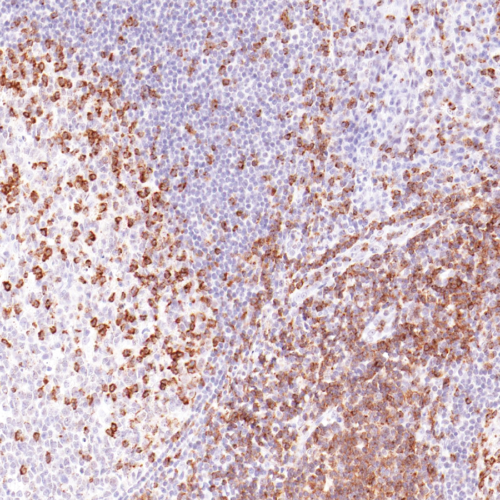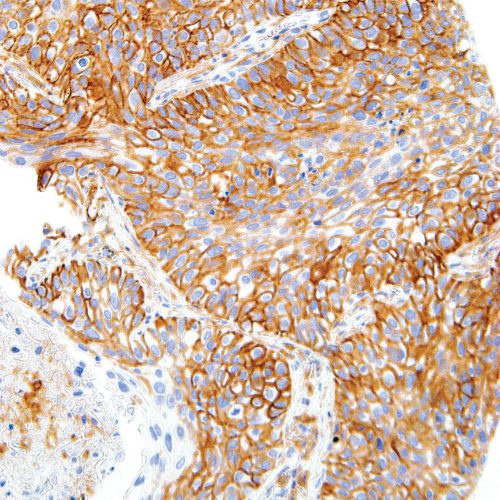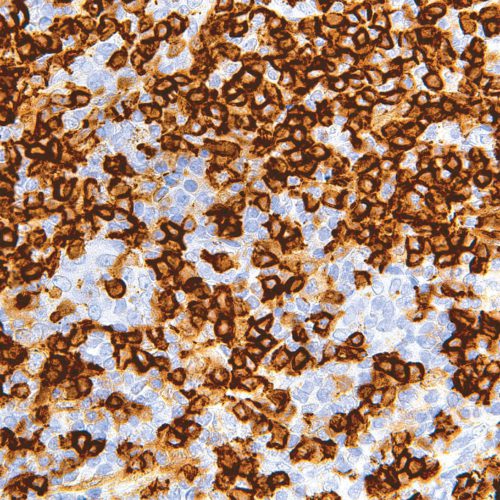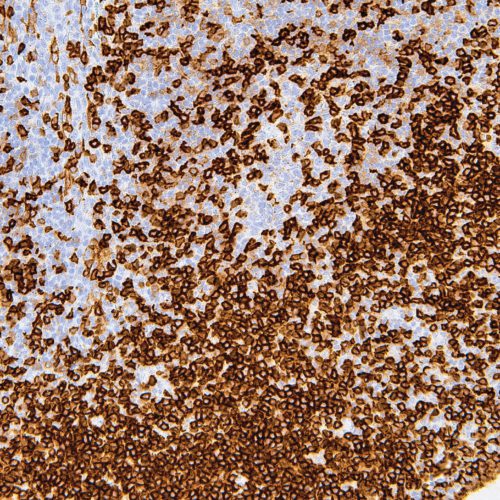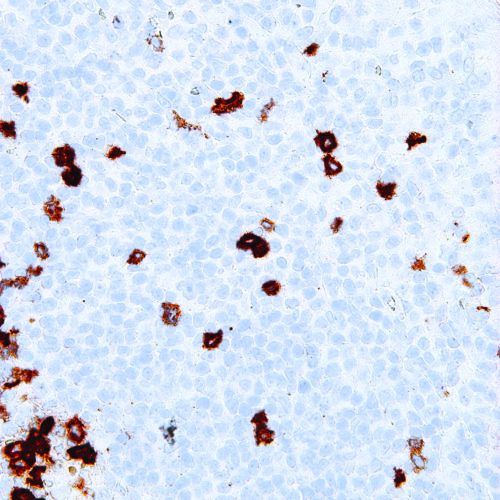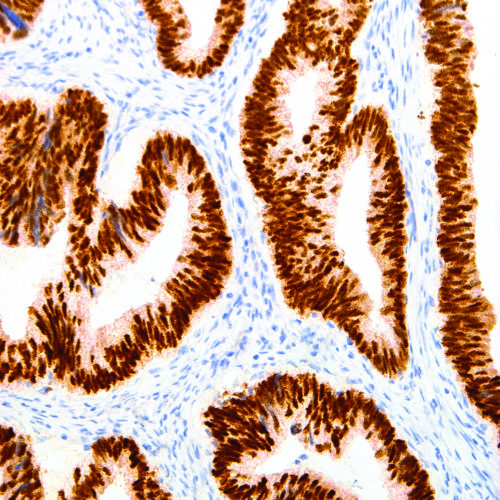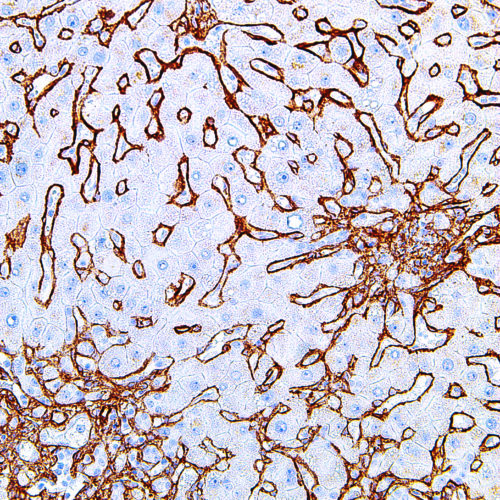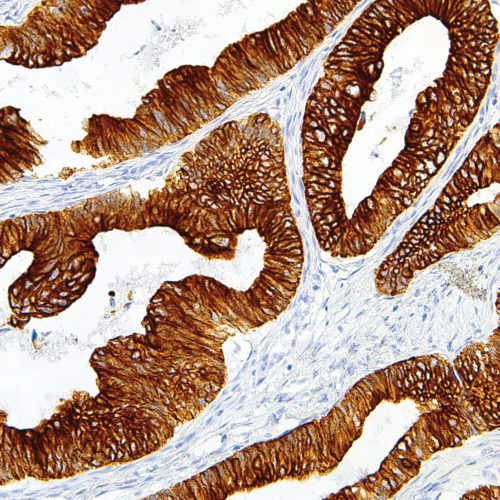High quality products to support Pathologists and Biological and Environmental Scientists
GeneAb™ CD2
$105.00 – $325.00Cluster of differentiation 2 (CD2) is a useful early T-cell lineage restricted antigen that is present in T-cell differentiation. As a pan-T-cell marker, CD2 staining is used for recognizing practically all normal T-cells, but may be deleted in some T-cell neoplasms. Since CD2 is present in most precursor and mature T-cell leukemias and lymphomas, it is useful in the evaluation of lymphoid malignancies. By using CD2 and CD25 staining, the recognition of systemic mastocytosis and mastocytic leukemia is supported.
GeneAb™ CD44
$45.00 – $160.00Cluster of differentiation 44 (CD44) is a glycoprotein receptor for hyaluronic acid, which plays a fundamental role in cellular adhesion, stromal binding, migration, and cell-cell interactions. Studies have suggested that the CD44-hyaluronate interaction is central to tumor invasiveness. Positive staining with Anti-CD44 is implicated in a multitude of different cancer types, including breast, prostatic, renal cell, colonic, hepatocellular, and genitourinary carcinomas, as well as Non-Hodgkin’s Lymphoma, metastatic melanoma, gastric cancer, and some soft tissue tumors. It has also been demonstrated that there is a positive correlation between tumor progression and increased expression of CD44v, a high molecular weight CD44 isoform that has been described in epithelial cells. Given the expression of CD44 in a wide range of cancers, the most practical application of CD44 immunostaining is its use in discriminating between urothelial transitional cell carcinoma in situ from non-neoplastic changes in the urothelium.
GeneAb™ CD45RA
$65.00 – $210.00CD45R, also known as MB1, is an isoform of CD45 that is a member of the protein tyrosine phosphatase (PTPase) family. CD45R is expressed specifically on the surface of hematopoietic cells, and has demonstrated function as a regulator of the antigen and cytokine receptor signalling of B and T cells. Given that the antigen is located in the membrane of all B cells, with the exception of plasma cells and some mature T cells, Anti-CD45R exhibits specific reactivity with most B lymphocytes. The use of Anti-CD45R is primarily useful in distinguishing B cell lymphomas from T cell lymphomas, with specific reactivity to follicle center cells, mantle cells, some medullary thymocytes, and 80% of B cell lymphomas.
GeneAb™ CD5
$115.00 – $785.00Cluster of differentiation 5 (CD5) is expressed in high levels on the surface of T cells, while controversy surrounds the expression levels and role of CD5 in B cells. As a part of a diagnostic panel, its utility lies predominantly as a marker for T cells, with over 70% of T cell neoplasms expressing CD5. In particular, it is correlated with chronic lymphocytic leukemia/small lymphocytic lymphomas, mantle cell lymphoma, as well as a subset of diffuse large B cell lymphomas. CD5 demonstrates positive expression in thymic carcinomas, and is not as sensitive as CD3. CD5 also has value as a prognostic indicator, being associated with poor prognosis in acute T cell lymphoblastic leukemia.
GeneAb™ CD57
$70.00 – $250.00Cluster of differentiation 57 (CD57), also known as NK-1, is an antigen detectable in natural killer cells, some T-lymphocytes and normal peripheral blood mononuclear cells, myeloid cells, and a variety of polypeptides, lipids, and chondroitin sulfate proteoglycans. CD57 is indicated as a marker for tumors of neuroendocrine origin, including pheochromocytomas, paragangliomas, carcinoid tumor, and medulloblastomas, as well as various neural tumors including neuromas, neurofibromas, schwannomas, and granular cell tumors. CD57 is also detectable in ganglioneuroma and prostate carcinoma. Anti-CD57 is used to distinguish nodular lymphocyte-predominant Hodgkin’s lymphoma from T-cell/histiocyte-rich large B-cell lymphoma, nodular sclerosis Hodgkin’s disease, and follicular lymphoma.
GeneAb™ CDX-2
$85.00 – $635.00CDX-2 is a caudal-related homeobox transcription factor that is expressed by intestinal epithelial cells. CDX-2 is a useful marker for gastrointestinal carcinoma, and for determining the origin of gastrointestinal metastatic adenocarcinoma and carcinoids. Anti-CDX-2 is used for differentiating lung and metastatic colorectal adenocarcinoma, however mucinous ovarian carcinoma also react positively with Anti-CDX-2, thereby limiting the ability to differentiate from metastatic colorectal adenocarcinoma.
GeneAb™ Collagen Type IV
$85.00 – $340.00Collagen Type IV is a primary component in the basal lamina that is used as a marker to observe the presence of the lamina and examine its structure. In addition to the epithelial basal lamina, Anti-Collagen Type IV stains mesenchymal components. It is useful for identifying soft tissue cancers including schwannomas and leiomyomas. Anti-Collagen Type IV frequently reacts with these tissues after becoming well-differentiated and malignant. The use of Anti-Collagen Type IV produces more reliable results than non-specific silver reticulum stains when investigating the vascular elements of neoplasms, hemangiopericytoma, angiosarcoma and epithelioid hemangioendothelioma.
GeneAb™ Cytokeratin 18
$60.00 – $240.00Cytokeratin 18 (CK18) is present in simple, glandular, and transitional epithelial cells, but is absent in stratified epithelial cells. CK18 usually multimerizes with Cytokeratin 8, and Anti-Cytokeratin 18 is useful for detecting adenocarcinomas of simple and glandular epithelium origin, as well as poorly differentiated squamous carcinoma cells.
